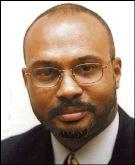Keith Collister, Contributor

GORDON
THE COMPETITIVENESS Company, launched by the Jamaica Exporters' Association (JEA) yesterday, aims to encourage Jamaican firms to adapt and compete effectively internationally, said JEA president, Dr. André Gordon.
The primary role of the new subsidiary was in supporting the country's efforts to improve its competitiveness Dr. Gordon told his audience that at a seminar held at the Terra Nova Hotel in St. Andrew.
In his 'survival of the fittes' concept, Darwin considered to be the fittest "those species who were the most adaptable", not the most powerful as appears to be widely assumed today, Dr. Gordon said. "As the global competitive space becomes more demanding, we cannot afford to adapt at the speed of evolutionary time".
The concept for the Competitiveness Company grew out of the JEA perceiving a need to apply what had been learned from its predecessor Jamaica Cluster Competitiveness Project (JCCP), launched in September 2002. Over its two-year life, the JCCP targeted three of the industries in Jamaica's National Industrial Policy - Agro business, Tourism and Entertainment - to become "clusters", with over 300 firms participating, as opposed to the original plan of 30 firms per cluster.
NEW COMPETITIVE ADVANTAGES
The project sought to build new competitive advantages for these clusters at the firm level, identifying new markets, distribution channels and forums for partnership.
The Jamaican co-head of the Competitiveness Company, Mrs. Beverly Morgan, outlined the JEA's unique partnership with Boston-based consulting firm 'On the Frontier', which implemented the JCCP project. Funded by the United Kingdoms' Department for International Development (DFID), the Competitiveness Company is a joint venture subsidiary with On the Frontier, and will be an in-house centre of expertise in competitiveness on which the public and private sectors can draw.
Talented young Jamaicas will be trained as consultants, who will then serve as cluster co-ordinators and competitiveness advisers to firms in Jamaica. The goal is for the Competitiveness Company to ultimately evolve into the Jamaican centre of applied research on issues of national competitiveness.
IMPORTANCE OF CLUSTERS
Mrs. Morgan said clusters are important as networks enable people to build social capital and therefore the trust required to cooperate to invest in the future, citing the recent success of the 'Unique Jamaica' cluster for small hotels.
The keynote speaker, On the Frontiers' Chairman Michael Fairbanks, stated that Jamaica's current economic model of comparative advantage based on natural resource exports and low wages directed by a Government "master economic strategist" was a failure. The level of interpersonal trust in Jamaica was low, with two thirds of Jamaicans surveyed saying they did not trust their fellow Jamaicans.
Mr. Fairbanks argues that countries require a crisis to change the "mental models" dictating their responses. In the case of Jamaica, he believes that Jamaican's have become too good at handling crises (they have been in constant crisis for over 30 years), dulling their receptivity to change.
As someone who has been coming to Jamaica for a long time, he believes by any reasonable definition, we are in crisis, with our smartest people leaving due to lack of opportunity; economic performance essentially flat over the decades; and a clear deterioration in human values which he says is linked to our lack of prosperity.
He believes the five main preconditions for changing our economic model are : a sense of crisis, moral purpose, receptivity, insight and leadership, which requires an individual with all the preceding characteristics. In a survey of those attending the seminar, the sense of crisis scored highly but leadership had a low score. By leadership
is meant not simply political leadership by a political leader, but the thousand most influential people in the country, whose economic model Mr. Fairbanks described as " Breakfast with the Minister", a response which he said was inadequate.










